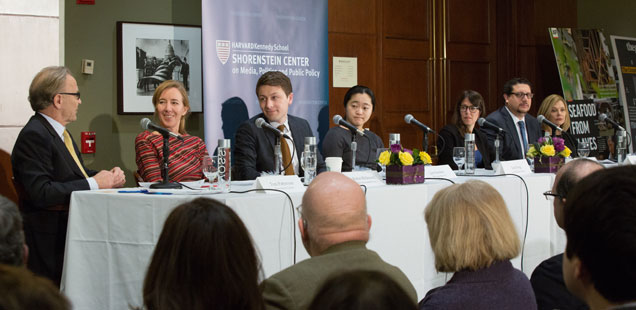2016 Goldsmith Seminar on Investigative Reporting

A panel discussion with the winner and finalists of the Goldsmith Prize for Investigative Reporting: Robin McDowell, The Associated Press; Kimberly Kindy, The Washington Post; Michael LaForgia, Tampa Bay Times; Jessica Silver-Greenberg, The New York Times; Lisa Song, InsideClimate News; Jon Swaine, Guardian US; and Thomas Patterson, Shorenstein Center interim director (moderator).
The use of slave labor by fishing fleets in Southeast Asia was an open secret, a story that lots of people seemed to know but that nobody had ever really covered, said Robin McDowell, a reporter for The Associated Press. And that was why McDowell, together with a team of AP reporters, launched an investigation that would uncover massive human rights violations, lead to the freeing of more than 2,000 enslaved fishermen, and spur legislative action by the U.S. Congress.
“If we didn’t at least look into it and make the rest of the world care, then we’re not doing our jobs,” said McDowell, whose reporting team received the $25,000 Goldsmith Prize for Investigative Reporting from the Shorenstein Center on Media, Politics and Public Policy.
McDowell and representatives of the five other finalists nominated for the prize joined Tom Patterson, the Shorenstein Center’s interim director and Bradlee Professor of Government and the Press, at a seminar Friday to discuss their findings, detail the challenges they faced, and comment on the evolution of investigative reporting.
Jessica Silver-Greenberg described how reporting on the dry and arcane subject of legal arbitration, in a series called “Beware the Fine Print,” by her and her New York Times colleagues, discovered a legal system that had given large corporations a virtual “get out of jail free” card by cutting off legal avenues such as class action suits. In the end, she said, the story was about how corporations had “written themselves out of the legal system.”
An investigation by the Tampa Bay Times, “Failure Factories,” described how the Pinellas County School Board abandoned integration and then starved black schools in poor neighborhoods of resources. Reporter Michael LaForgia described the exhausting, data-driven, 18-month investigation as a grueling marathon, but one that wasn’t hard to keep working on because of the sheer injustice of what they were uncovering.
InsideClimate News was honored for a series reporting on the cutting-edge climate research conducted by Exxon decades ago, and how the company then worked to cast doubt on the scientific consensus their own research had confirmed. The series was spurred by the small news organization’s publisher and his belief that news organizations needed to do better in finding whistleblowers and not waiting for whistleblowers to come to them.
The Guardian US and the Washington Post were both honored for series documenting the number of people killed by the police in the United States – “The Counted” was the Guardian’s series, “Fatal Shooting by Police” the Washington Post’s effort.
Responding to an audience question, the Post’s Kimberly Kindy described a reporter’s motivation for the grueling, months-long, investigative work.
“If you’ve been doing this long enough, you know that the most you’re going to be able to do is just create some small change,” she said. “And then you hope that it holds and that some other reporter comes along and more small change happens, and it continues.”
McDowell said the motivation in her reporting was perhaps more personal this time: her conversations with desperate, enslaved fishermen being held on an Indonesian island. “I really felt confident being able to tell them, “We will get you off this island,”” she said.
Article by Robert O’Neil. Photo by Martha Stewart.